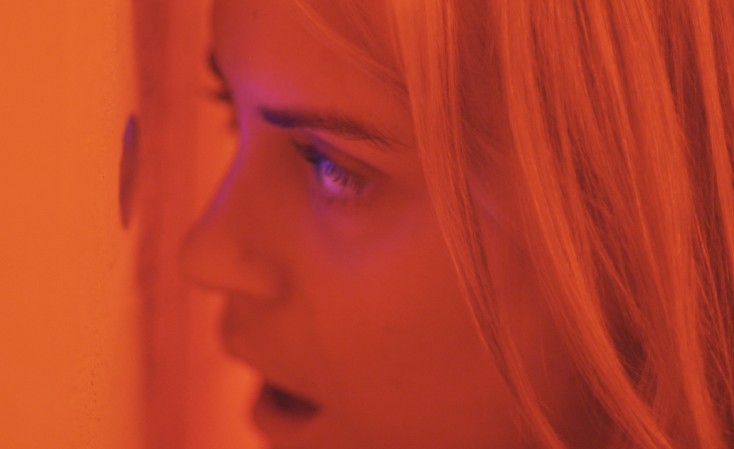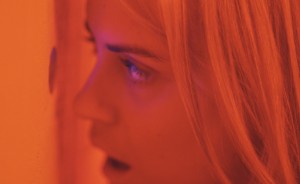By ANGELA DAWSON
Front Row Features
HOLLYWOOD—Taylor Schilling is ready to go back to the set to shoot the fourth season of the popular prison dramedy “Orange is the New Black.” Season Three of the series premieres on Netflix Friday, June 12.
The Boston native plays Piper Chapman, the pretty All-American-type who has an awakening when she is sentenced to 15 months in prison, following a conviction for drug trafficking. She is caught by the Feds transporting $50,000 in illegal drug money to Belgium at the request of her girlfriend.
The Emmy-winning Netflix series in which Schilling stars alongside a cast that includes Kate Mulgrew, Laura Prepon, Uzo Aduba, Danielle Brooks, Natasha Lyonne and Jason Biggs, was inspired by the bestselling memoir by Piper Kerman, who actually served a year in prison, and adapted for the small screen by award-winning producer Jenji Kohan.
At an interview, Schilling is looking spring-like in a print jumpsuit that reaches just below her knees. She discusses her show and “The Overnight,” a new independent comedy written and directed by Patrick Brice, in which she co-stars with Jason Schwartzman, Adam Scott and French actress Judith Godreche. Because of its swift 11-day shooting schedule, the low-budget film afforded Schilling an opportunity to star in it during her down time between shooting seasons one and two of “Orange is the New Black.”
Like her onscreen TV character, Schilling is educated and savvy. After earning her B.A. at Fordham University, she attended two years of graduate school at the famed New York University to pursue acting jobs full time. The gamble paid off. She made her feature film debut in 2007’s horror movie “Dark Matter.” She subsequently appeared in “Atlas Shrugged, Part 1,” in which she portrayed the character of Dagny Taggart, in the adaptation of Ayn Rand’s ultraconservative story.
For her work on “Orange is the New Black,” the 30-year-old single actress has earned two Golden Globe nominations, an Emmy nomination and a shared ensemble award from the Screen Actors Guild. Depicting a bisexual character, she also has received kudos from various gay and lesbian organizations.
As she sits down to talk, she notices herself in a mirror across the room, and comments, “This is weird. I’m sitting right in front of a mirror. I’m speaking to myself.” Then she spies an old-fashioned cassette tape recorder, and coos, “That is so cool! I was thinking the other day about cassette tapes.”
Q: So you star in this film “The Overnight.” Where was your best overnight?
Schilling: Oh, jeez. I feel like it’s all so specific to the situation, right?
Q: You could go to the most expensive place…
Schilling: And have a lousy time. But you can also have a great time in a tent.
Q: How did you keep a straight face while on the set?
Schilling: I feel that I earned my stripes on this a little bit. I was terrible. Terrible! I laughed a lot. The guys just kept going but I actually had the giggles, and they had to use it. It was sort of a different vibe than I’d worked on in a while. It was fun.
Q: Do you recall a scene that was hilarious to shoot?
Schilling: I honestly think there were parts of every single scene that we shot that I was inappropriately laughing. So, thanks everybody. Thanks to them for holding me up.
Q: How was it shooting a film in 11 days? How did this work into your schedule with “Orange is the New Black?” Was it shot during your hiatus?
Schilling: Yeah. This was shot during my first hiatus. The hiatus I’m on right now is my second. It was easy because we shot for 11 days, and we had scheduled it far enough in advance that I was able to move it around with other press responsibilities.
Q: What interested you in the story of this couple?
Schilling: I really loved the notion about how much they loved each other. They wanted this to work and that abstract space in a relationship where you love someone so much and their desire for it to work, but there’s that scratching sense that there is something missing and it isn’t quite right. Do you bring it out in the open? Do you sweep it under the carpet? No one knows how to be in a relationship. There are a lot of ways to gather a lot of tools. I also just loved the pureness of that. There was an idea that they’d been together for so long. This girl had been in sororities and a cheerleader, and there was a lack of judgment and malice in the relationship that I found very refreshing. (My character) so much wanted to make it work and yet at the same time, she wanted to listen to her own voice, and feel her way through the situation. She was listening to herself that things weren’t adding up. So I think there was something (about this film) that was really honest, I guess. It rang very true to me, and I liked that juxtaposition.
Q: Do you think this is a problem common among young parents where they still want to explore sexually but feel constrained because now they have responsibilities?
Schilling: It’s interesting to me, there is a sense in film that a lot of times movies effectively neuter parents, they’re no longer sexual beings. That idea of still be sexual and still exploring things ever goes away. It’s just that I don’t think we see the stories about the reality of what’s going on. There’s a transition that goes on from before you have a family and afterwards but it’s not that the sexuality goes away; it just changes.
Q: Can you share anecdotes about dinner parties you’ve attended? I’m assuming you haven’t been to a dinner party like the one depicted in this film.
Schilling: I haven’t. (She laughs.) Honestly, I have no answer to that.
Q: What would be the perfect dinner party? Who would you invite to it?
Schilling: (long sigh) Oprah. Gandhi.
Q: Do you throw dinner parties?
Schilling: I don’t. (She laughs.)
Q: What’s your favorite thing about Adam Scott, who plays your husband in this?
Schilling: Whenever you meet somebody, it’s a funny thing about chemistry. It’s a very nebulous thing. It is a cool, though. I like that about my job. I get a chance to meet new people and when it works, it’s like, “Oh, there’s a kindred fellow on this path!” And then you have this necklace of people with whom you have this connection with; it’s quite intimate.
Q: When do you go back to work on “Orange is the New Black?”
Schilling: The middle of June. We go back for the third season.
Q: What are you looking forward to?
Schilling: I’m really just excited to see everybody just continue to spread their wings. I think Jenji (Kohan, the show’s creator) is just so brilliant in pushing all these characters to their wit’s end.
Q: The original book was about Piper’s one year in prison.
Schilling: Oh yeah.
Q: You guys have gone way beyond the book now.
Schilling: Yeah, sort of almost midway through the first season, the book at played its part. And really, ever since, it’s just been the mind of Jenji and the writer.
Q: As the star of the series, do you have any thoughts on what some have called the Prison Industrial Complex with mass incarceration?
Schilling: Uhhh, no. I’m really just happy to be on such a great show that’s bringing some cool stories to more people.
Q: Did you stay at a prison overnight?
Schilling. No. I visited. Before we started the first season, I had made a decision not to go to any prisons. But before shooting the second season—about the time we finished shooting “The Overnight”—I spent some time at Rikers (Island, a prison in New York) with Piper Kerman, who is the real Piper.
Q: Is that where she was incarcerated?
Schilling: No, she was in Connecticut. In Danbury, where Martha Stewart (served time). I don’t think they were there at the same time. It was really a powerful experience. I’ve also now spent some time with the Women’s Prison Association now, and they do such interesting work, but the thing that is interesting to me is the parallels between what our show is doing and what is happening, even aesthetically, like being in Rikers in the Women’s Prison Camp, is so spot on. It’s bone chillingly accurate. It’s exciting work.
Q: What do you do in your free time?
Schilling: I go for walks. I go to parties; I just don’t host them. They’re really a nightmare, to be honest.
Q: Since you’re based in New York, you probably get a chance to get out and blend in in the city, right?
Schilling: Yeah.
Q: Can you go out and not be bothered by paparazzi?
Schilling: Oh yeah. My life is pretty simple. There are certain areas (of the city) where there are more photographers, like at an airport. Like, when I come into LAX (Los Angeles International Airport), they’re lined up to take your picture. Anybody. If you want your picture taken you just wave. You can get papped at LAX. But as far as walking around New York, I don’t. Thank goodness. I feel I should knock on wood. But I also walk around L.A. I like on the East Side (of New York) now, but I think L.A. is okay to walk around.






